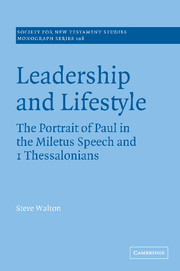Book contents
- Frontmatter
- Contents
- Acknowledgements
- Abbreviations
- 1 Why study the Miletus speech?
- 2 Are parallels in the eye of the beholder?
- 3 The Miletus speech in context
- EXCURSUS 1 THE TEXT AND TRANSLATION OF ACTS 20.28b
- EXCURSUS 2 THE TEXT OF LUKE 22.17–20
- Bibliography
- Index of ancient texts
- Index of modern authors
- Index of subjects
1 - Why study the Miletus speech?
Published online by Cambridge University Press: 22 September 2009
- Frontmatter
- Contents
- Acknowledgements
- Abbreviations
- 1 Why study the Miletus speech?
- 2 Are parallels in the eye of the beholder?
- 3 The Miletus speech in context
- EXCURSUS 1 THE TEXT AND TRANSLATION OF ACTS 20.28b
- EXCURSUS 2 THE TEXT OF LUKE 22.17–20
- Bibliography
- Index of ancient texts
- Index of modern authors
- Index of subjects
Summary
The study of the portrait of Paul in Acts has a long history; it has been investigated by virtually every modern scholar who has written substantially on Acts. Two particular issues gave rise to this study: how far the portraits of Paul in Acts and the Pauline epistles are compatible, and what knowledge Luke has of the Pauline epistles. In both of these debates Paul's Miletus speech (Acts 20.18b–35) is pivotal.
On the one hand, it is the only Pauline speech in Acts given to a Christian community – in other words, it is addressed to an ‘epistle-like’ situation, by contrast with other Pauline speeches, which are evangelistic or apologetic. It is therefore a key ‘test case’ for the compatibility of the two portraits of Paul, for it offers the opportunity to compare Luke's and Paul's dealings with Christians and, in particular, the understandings of Christian leadership which are presented.
On the other hand, the speech's language and ideas are widely recognised as paralleling the language and ideas of the Pauline epistles. This raises the question of the relationship between the speech and the epistles: are the epistles the source for the speech, directly or indirectly, or is Luke utilising independent Pauline tradition or composing freely?
In order to orientate ourselves, we shall consider the state of play in these debates and highlight the contribution which studying the Miletus speech can make to them.
- Type
- Chapter
- Information
- Leadership and LifestyleThe Portrait of Paul in the Miletus Speech and 1 Thessalonians, pp. 1 - 33Publisher: Cambridge University PressPrint publication year: 2000



